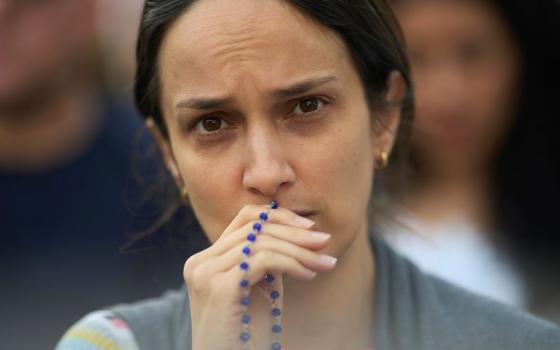
(Unsplash/Providence Doucet)
In the Bible, we have different vocation stories of responding, running away and turning down God's call. Today, discerning the voice of God amidst all luxury and entertainment, with the advent of modern technology and access to the internet and also the counter-witness, has had an impact on vocations.
In a given situation (decline in vocations), my experience takes me back to following the ethics of religious life and the founder's charism. Indeed, going back to our roots and the founders/foundresses spirit resonates deep feelings, to evaluate and rectify, that which needs attention, lest we move our focus from living the spirit of the founder/foundresses, to only mere apostolates and accolades received.
Pope Francis once dealt with the topic as to why vocations are on the decline in the modern world during his meeting with the Congregation for Consecrated Life.
And Cardinal Franc Rode once told religious orders "Religious life, being a gift of the Holy Spirit for each religious and the church, depends especially on fidelity to its origins, fidelity to the founder and to the particular charism." Central to this renewal is fidelity to the charisms of the founders, which "attracts vocations," he added.
Advertisement
The charism of the founder/foundresses and how the founding members incorporated their personal charism to that of the founder/foundresses filled the convents and seminaries with many vocations. Today, emptying our minds of our personal ideas and integrating the mind of the founder/foundresses would bridge the gap. The quiet listening would enable them to know their personality and how their heart, mind and soul was gripped by God, that they saw nothing but doing the will of God by giving up the comforts.
Another reason for decline in vocations Rode says: "Prayer, especially community prayer and the sacramental liturgy, was minimized or abandoned. Penance, asceticism and what has been called 'negative spirituality' became things of the past." While the late Pope Benedict XVI advised religious orders to "return to your roots."
At the transfiguration, Jesus manifested his intimate relationship with his father while his disciples who represented our community, had the mountain experience, were overshadowed by the Spirit only later to be made aware of their reality. The journey of vowed life, the mountain experience and community life remind us of our roots and keeps us grounded.
In fact, in the community where I am placed, the weekly schedule keeps the members knitted amidst trials and problems of community living. Each day the weekly schedule begins from the mountain experience, and ends, at the end of the day, with different activities such as organized creation, faith sharing, shared reflection, catechesis, family visits, reconciliation and so on.
The weekly schedule brings back memories of the past experiences after the hectic day, de-stresses and refreshes the mind, body and soul with hearty laughter and cheerfulness. In my experience, it improves concentration, emotional and mental health and promotes healthy living. The shared reflections in our community are a means to inspire and invigorate, enlivening the lives to reflect deeper and drink from the living waters of life.
When my sisters share vivid faith experiences, one can relate to the similar experiences one had in their lives. This sharing of experiences is what the disciples did after they returned from the missionary journey in Luke 10:17.
The shared reflections in our community are a means to inspire and invigorate, enlivening the lives to reflect deeper and drink from the living waters of life.
So, speaking about our vocation story during our visits to families can inspire the younger generation. Using media for vocation promotion and creating content of the apostolates and uploading it on social media platforms is another way of attracting vocations. Organizing discernment programs for the youth can create a culture of vocations and moreover witnessing to the religious life as members of the community wherever we are placed. In Acts 2, we see Peter together with other 11 preaching and adding to the number of the church.
Community life is one of the best things that could happen in the life of the religious who are set apart and sent forth to make more disciples. Yes, just as we don't choose our parents, we don't choose the community and the members with whom we want to live.
Indeed, religious life is a treasure that we carry in earthen vessels and is nurtured by prayer and the word of God prayed together as a community. Certainly, we are put together in the community unknowingly on purpose for a purpose within the plan of God. A quote from Amos comes to mind, where Amos tells Amaziah, "I was not a prophet. I wasn't even the son of a prophet. I was a shepherd. I also took care of sycamore-fig trees. But the Lord took me away from taking care of the flock. He said to me, 'Go. Prophesy to my people Israel.' " Yes, we are placed in certain communities for a purpose to turn the tests into testimonies, trials into triumphs and mess into messengers, though it entails insults and rejection, like what prophet Amos encountered in his life.
Therefore, the different initiatives and programs undertaken to improve or raise the spiritual realm in exhibiting and incorporating the attitudes and behavior patterns of Christ Jesus, would be a boost to foster vocations and return to our roots being more grounded.
The Lord declares "You are my witnesses," in Isaiah 43:10; and "you shall be my witnesses" in Acts 1:8. So, vocations and witness are interconnected, beginning with the family values and family prayer as the primary place to sow seeds of vocations.
Therefore, the decline in vocations I feel is a litmus test for us religious to make the necessary amends and go back to our roots. For truly, these two — the family and being a true witness, by returning to our roots would have a favorable reply to the question, do you have vocations?







